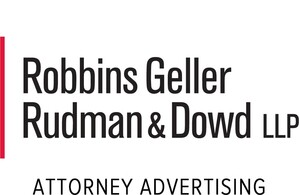NEW YORK, July 19, 2016 /PRNewswire/ -- Robbins Geller Rudman & Dowd LLP ("Robbins Geller") (http://www.rgrdlaw.com/cases/emergent/) today announced that a class action has been commenced on behalf of purchasers of Emergent Biosolutions Inc. ("Emergent") (NYSE:EBS) common stock during the period between January 11, 2016 and June 21, 2016 (the "Class Period"). This action was filed in the District of Maryland and is captioned Sponn v. Emergent Biosolutions Inc., et al., No. 8:16-cv-02625-RWT.
If you wish to serve as lead plaintiff, you must move the Court no later than 60 days from today. If you wish to discuss this action or have any questions concerning this notice or your rights or interests, please contact plaintiff's counsel, Samuel H. Rudman or David A. Rosenfeld of Robbins Geller at 800/449-4900 or 619/231-1058, or via e-mail at [email protected]. If you are a member of this class, you can view a copy of the complaint as filed or join this class action online at http://www.rgrdlaw.com/cases/emergent/. Any member of the putative class may move the Court to serve as lead plaintiff through counsel of their choice, or may choose to do nothing and remain an absent class member.
The complaint charges Emergent and certain of its officers and directors with violations of the Securities Exchange Act of 1934. Emergent is a specialty biopharmaceutical company. Emergent's anthrax vaccine, BioThrax (Anthrax Vaccine Adsorbed) ("BioThrax"), is the only one licensed by the U.S. Food and Drug Administration ("FDA"). In September 2011, Emergent entered into a five-year procurement contract with the U.S. government for 44.75 million doses of BioThrax. By the start of the Class Period, Emergent was reporting it had sold all of its BioThrax on hand and was working on a massive expansion of its BioThrax production facilities.
The complaint alleges that during the Class Period, defendants issued materially false and misleading statements regarding the Company's business and financial prospects. Specifically, with no reasonable basis to believe that the Company's renewal of its contract with the U.S. government would call for the same level of, much less increased, purchases of BioThrax, Emergent claimed it remained on track to receive the lucrative renewal of its five-year exclusive anthrax vaccine procurement contract. Emergent also repeatedly emphasized an ongoing strong demand for BioThrax in light of the U.S. government's funding of Emergent's massive expansion of its BioThrax production facility, claiming with no reasonable basis that the expansion would enable the Company to manufacture some 20 to 25 million additional doses of BioThrax annually, which the U.S. government would purchase over the following five-year period in order to build the U.S. Strategic National Stockpile ("SNS") of anthrax vaccine to 75 million doses. As a result of defendants' materially false and misleading statements, Emergent common stock traded at artificially inflated prices, reaching a Class Period high of $43.95 per share, and enabling certain of the defendants to sell their personally held shares of Emergent common stock for proceeds of over $14.5 million.
Then on June 22, 2016, before the open of trading, Emergent announced that the U.S. government had issued two official solicitation notices indicating that it would only be purchasing 29.4 million doses of the BioThrax vaccine for its SNS over the following five years – approximately one-third less than the 44.75 million doses in the original contract and far less than the 75 million doses the Company had led the investment community to believe the U.S. government sought to purchase. Emergent also disclosed that instead of more first-generation BioThrax anthrax vaccine, the U.S. government was seeking to procure a newer, faster-working next-generation anthrax vaccine, once one was approved, and that it was putting its supply bid for the rest of its anthrax vaccine procurement out to other companies, such that Emergent stood to lose its lucrative exclusivity. In response to this news, the price of Emergent stock declined from a close of $39.32 per share on June 21, 2016 to a close of $31.33 per share on June 22, 2016.
Plaintiff seeks to recover damages on behalf of all purchasers of Emergent common stock during the Class Period (the "Class"). The plaintiff is represented by Robbins Geller, which has extensive experience in prosecuting investor class actions including actions involving financial fraud.
Robbins Geller is widely recognized as one of the leading law firms advising U.S. and international institutional investors in securities litigation and portfolio monitoring. With 200 lawyers in 10 offices, Robbins Geller has obtained many of the largest securities class action recoveries in history and was ranked first in both total amount recovered for investors and number of securities class action recoveries in ISS's SCAS Top 50 Report for the last two years. Robbins Geller attorneys have shaped the law in the areas of securities litigation and shareholder rights and have recovered tens of billions of dollars on behalf of the Firm's clients. Robbins Geller not only secures recoveries for defrauded investors, it also strives to implement corporate governance reforms, helping to improve the financial markets for investors worldwide. Please visit rgrdlaw.com for more information. Please visit rgrdlaw.com/cases/emergent/ for more information.
https://www.linkedin.com/company/rgrdlaw
https://twitter.com/rgrdlaw
https://www.facebook.com/rgrdlaw
https://plus.google.com/+Rgrdlaw/posts
Logo - http://photos.prnewswire.com/prnh/20150415/198876LOGO
SOURCE Robbins Geller Rudman & Dowd LLP
Related Links
http://www.rgrdlaw.com/?utm_source=PRNewswire&utm_medium=Press%20Release&utm_campaign=Site%20Preview
WANT YOUR COMPANY'S NEWS FEATURED ON PRNEWSWIRE.COM?
Newsrooms &
Influencers
Digital Media
Outlets
Journalists
Opted In



Share this article